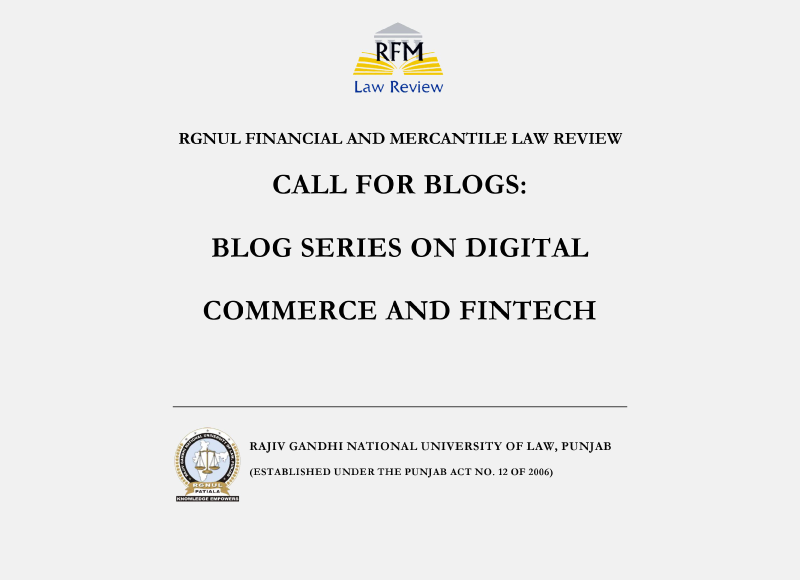Call for Blogs: RGNUL RFMLR Sidebar Blogs on Digital Commerce and FinTech
RGNUL RFMLR invites submissions on a rolling basis on corporate law, securities law, insolvency law, banking law, arbitration law, competition law, taxation law, and on other contemporary issues in commercial laws under RFMLR Call for Blogs (Open Theme). About Institution and Journal The Rajiv Gandhi National University of Law is a National Law University located in Patiala, Punjab,… Read More »

RGNUL RFMLR invites submissions on a rolling basis on corporate law, securities law, insolvency law, banking law, arbitration law, competition law, taxation law, and on other contemporary issues in commercial laws under RFMLR Call for Blogs (Open Theme).
About Institution and Journal
The Rajiv Gandhi National University of Law is a National Law University located in Patiala, Punjab, India. It was established in 2006 by the Punjab Government as a university dedicated to the field of Legal Education.
RGNUL Financial and Mercantile Law Review (RFMLR) is a bi-annual, student-run, double-blind peer-reviewed law journal published by the Rajiv Gandhi National University of Law, Punjab. The journal was first published in the year 2014 and gives an opportunity to the legal academia, legal professionals, and law students to contribute cutting-edge, doctrinal, theoretical, and empirical research in the field of business and commercial laws.
The journal is indexed on SCC Online and has been ranked amongst the ten most accessed law school journals by SCC Online.
About RFMLR Blog
The Editorial Board of RFMLR operates the RFMLR Blog. The aim of the RFMLR Blog is to provide a platform for expression of novel ideas and analysis of contemporary issues in commercial and mercantile laws. In addition to RFMLR Call for Blogs (Open Theme), the Editorial Board periodically releases theme-specific Call for Blogs to advance the discourse on a particular aspect of commercial laws. Previously, the Editorial Board has invited Blogs on Corporate Governance, Competition Law, Telecom Law, etc.
About Blog Series on Digital Commerce and Fintech Law
Financial Technology abbreviated as “FinTech” has evolved into a pioneering field that has turned the tables for e-commerce and the financial services sector. The rising popularity of digital transactions, open banking opportunities, and espousal of FinTech services are some of the key events that have been instrumental in the reshaping of traditional banking services. Additionally, the untapped potential of Blockchain Technology has paved the way for innovative and decentralized solutions in the field of arbitration, e-commerce, and digital payments. However, this relatively new field of law presents its own regulatory and policy issues.
In an attempt to encourage insightful discourse in the legal landscape around “FinTech”, the Editorial Board of RFMLR is now inviting blog submissions from legal academicians, practitioners, lawyers, legal experts, and students on a rolling basis.
Sub-Themes (Illustrative):
FinTech and Digital Payments
- RBI Guidelines on Digital Lending: Protecting the Borrower
- Neo-banking and the Regulatory Concerns
- RBI’s Report on QR Code: Future of Contactless Transactions
- An Analysis of RBI’s “Guidelines on Regulation of Payment Aggregators and Payment Gateways, 2020”
- Open Banking: A Step Towards Financial Inclusion in India?
- Account Aggregator Framework in India: A Critical Appraisal
- Introduction of Numberless Cards for Teenagers: Pros and Cons
- Significance of UPI for Digital Trade and Legal Issues
- Reimagining the Future of Digital Transactions vis-à-vis Blockchain Technology
- Reforms in Legal Framework for Card Transactions in India
- Role of NPCI in Promoting Digital Payments in India: A Legal Analysis
- Digital KYC and Blockchain-based Portable KYC Solution: Feasibility and Regulatory Concerns
- Peer-to-peer Lending Landscape in India
- FinTech vs. TechFin
- Tokenisation and its impact on Financial Markets
- The European Data Protection Board’s Guidelines 06/2020 on the interplay of the Second Payment Services Directive and the GDPR.
E-Commerce
- Consumer Protection (E-Commerce) Rules, 2020: An Analysis
- Blockchain Technology: The Driving Force for E-Commerce in Future
Virtual Currency and Regulatory Issues
- Central Bank and Digital Currency: Feasibility, Regulatory Challenges and its Impact on International Trade
- Cryptocurrency Regulation in India in the context of the Internet and Mobile Association of India v. Reserve Bank of India and the draft “Banning of Cryptocurrency and regulation of Official Digital Currency Bill, 2019”
Alternate Dispute Resolution (ADR) in the Digital World
- Transition from ADR to ODR: Inevitability and Legal Challenges
- Development of Blockchain Arbitration in India and Legal Challenges
Corporate Espionage
- Corporate Espionage in the Cyberspace and the need of a new Trade Secret Law in India
Intermediary Liability and Concerns for Digital Economy
- Chinese App Ban – Legality in Domestic and International Law
- Sharing of Source Code: “Public Interest” vs. IPR Rights of Companies
Submission Guidelines
The Editorial Board invites blog submissions from legal practitioners, professionals, academicians, and law students.
For detailed submission guidelines. Click here to view Brochure
Submission Deadline
The Editorial Board invites submissions for the Blog Series on Digital Commerce and FinTech Law, on a rolling basis.
Note: RFMLR invites submissions on a rolling basis on corporate law, securities law, insolvency law, banking law, arbitration law, competition law, taxation law, and on other contemporary issues in commercial laws under RFMLR Call for Blogs (Open Theme).
Contact
Email: rfmlr@rgnul.ac.in.
- Akshat Jain (Managing Editor): +91-97700 03070
- Ayushi Goel (Managing Editor):+91-82890 11869
- Soumya Tiwari (Senior Editor): +91-70008 55319
Official Website: Click here
Submitted by: Editorial Board,
RGNUL Financial and Mercantile Law Review

